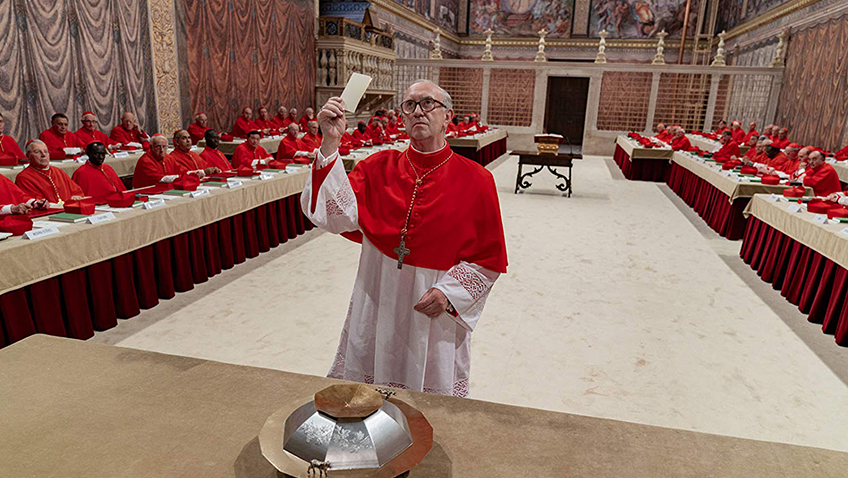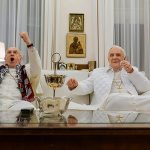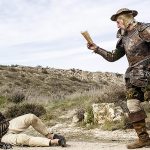Joyce Glasser reviews The Two Popes (November 29, 2019), Cert. 12A, 125 min.
Pope Francis may be hearing the buzz about Academy Award glory for two Papal interlopers – a septuagenarian and octogenarian – sitting in the gardens of the Castelo Gandolfo discussing their different perspectives on theological and social issues. If politics is showbusiness for ugly people, is the Vatican show business for holy people? Whatever your view, Fernando Meirelles (The Constant Gardener, City of God) takes a fresh look at an astonishing act of papal diplomacy and brilliantly dramatises the engrossing, humorous, witty and surprisingly human story behind it.
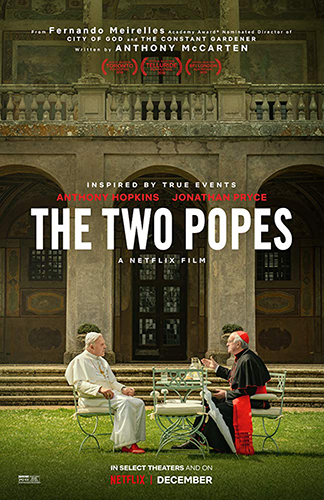 The pope is ruler of the smallest country in the world but is the spiritual leader of 1.2 billion subjects, most of whom are concentrated in South America where director Fernando Meirelles was born 64 years ago, in São Paulo, Brazil. In Buenos Aires, Argentina, 18 years earlier, Jorge Mario Bergoglio was born: the man who was to become Pope Francis, the first pope in history born in South America, the first born in the Southern Hemisphere and the first born outside Europe since the 8th Century. But it is not this tenuous affinity that attracted Meirelles to the story behind The Two Popes, but the extraordinary circumstances in which humble, reluctant Cardinal Bergoglio, hoping to retire, finds himself promoted to the job he never wanted.
The pope is ruler of the smallest country in the world but is the spiritual leader of 1.2 billion subjects, most of whom are concentrated in South America where director Fernando Meirelles was born 64 years ago, in São Paulo, Brazil. In Buenos Aires, Argentina, 18 years earlier, Jorge Mario Bergoglio was born: the man who was to become Pope Francis, the first pope in history born in South America, the first born in the Southern Hemisphere and the first born outside Europe since the 8th Century. But it is not this tenuous affinity that attracted Meirelles to the story behind The Two Popes, but the extraordinary circumstances in which humble, reluctant Cardinal Bergoglio, hoping to retire, finds himself promoted to the job he never wanted.
When we first see Cardinal Bergoglio (Jonathan Pryce), struggling to book a flight to Rome without the help of a secretary, he hardly looks like a head of state. As he wanders through the streets without bodyguards greeting people, conducts mass for a congregation he clearly connects with; discusses soccer, helps out at a soup kitchen this image of a humble man of the people continues. But as we hear, he is plagued with doubt and guilt. He has never recovered from the controversy when, in the “dirty war” his attempts to protect the clergy were condemned as collaboration with the dictatorship.
The other eponymous pope is John Ratzinger or the incumbent Pope Benedict XVI (Anthony Hopkins). In 2013, Pope Benedict XVI shocked the world when he resigned, the first pope to do so since 1415. But Pope Gregory XII was forced out by his rivals, a move which was hardly shocking after the tumultuous 14th century Avignon Papacy, in which there were 7 popes in 73 years.
Pope Benedict XVI, a scholar, teacher and theologian, was 78 when elected in 2005, the oldest pope elected since the 18th century. It is here that the Anthony McCarten’s intelligent script begins, with a recreation of the ritualistic papal election of Ratzinger after the death of John Paul II, in office for 26 years. The new pope needs a two-thirds majority of the 115 Cardinals, and, after the first vote, black smoke bellows out of the roof of the Sistine Chapel, as there is no majority. We hear the cardinals’ banter in between votes, and Plato’s theories of leadership are quoted: “the most important qualification for any leader is not wanting to be leader.” We hear someone retort, “then that eliminates Ratzinger, as he really wants it.”
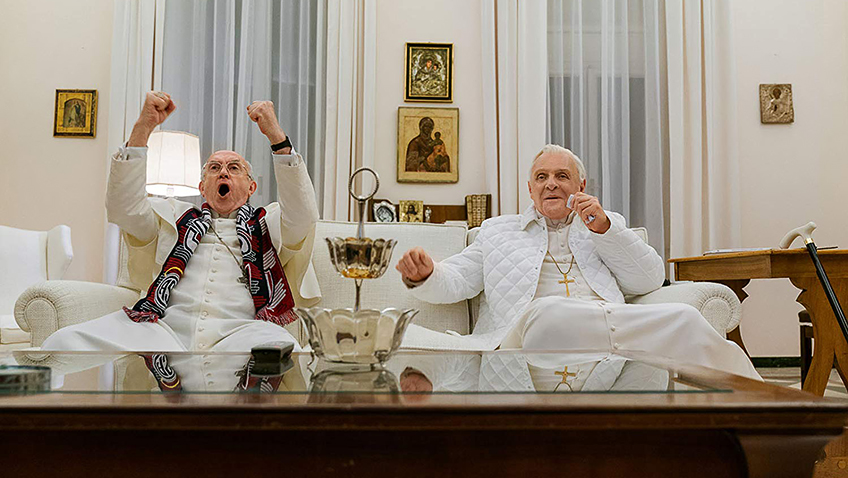
Anthony Hopkins and Jonathan Pryce in The Two Popes
Bergoglio watches nervously, relieved that he is passed over, and soon the crowds applaud the appearance of white smoke.
Flash forward to 2012 and the plane ticket. Frustrated with the direction of the Church and the paedophile scandals and having served the people of Argentina for 43 years, Cardinal Bergoglio is travelling to Rome to ask Pope Benedict XVI for permission to retire. Coincidentally, and unbeknownst to Bergoglio, at the same time Pope Benedict XVI has invited Bergoglio to meet with him to hear his confession.
It is this meeting of opposites, which first takes place in the gardens of the Castel Gandolfo the pope’s grand summer palace, and Pope Benedict’s unprecedented decision that results from the meeting, that is at the heart of the film. Far from being granted permission to retire, Bergoglio finds himself in the ironic position of trying to persuade Benedict XVI not to resign.
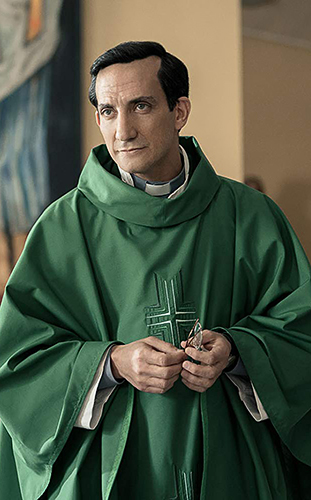
Juan Minujín in The Two Popes
The dialogue is witty and without recourse to exposition, it is revealing. Both actors shine, as they are clearly relishing this intelligent debate. In addition to airing different perspectives on social issues, Bergoglio comes across as the no frills, popular, modern Cardinal who acknowledges global warming and who is later shown giving refugees a tour of the Sistine Chapel. He is the pope who will not only renounce Castel Gandolfo but live more modestly outside the ornate papal apartments. We see that, when elected, he appears on the balcony of Saint Peter’s Basilica wearing a simple white cassock and not the regal red, ermine trimmed cape of tradition. In a gesture that comes across more touching now with our knowledge of Benedict’s inner turmoil, before blessing the crowd Pope Francis asks them to pray for his predecessor, and for himself as the new “bishop of Rome”.
With this script, the New Zealand novelist, playwright, journalist, TV writer and filmmaker Anthony McCarten emerges as the man who gives actors BAFTAs and Academy Awards. Eddie Redmayne got them for The Theory of Everything; Gary Oldman, for the Darkest Hour, and Remi Malik took them home for Freddie Mercury biopic, Bohemian Rhapsody. Has McCarten’s pen bestowed two more?
His challenge here is to humanise these two men who have spent their lives wrapped up in the ritual world of organised religion and the inflexible Catholic Church where paedophile priests are moved to other districts rather than defrocked and starving people queue up to kiss the pope’s ring, which, if cashed in, could feed the population for a year.
For McCarten, Meirelles and their brilliant two leads it’s mission accomplished. We learn about their differing tastes in music (Ratzinger apparently plays the piano to a professional standard), that they root for different soccer teams (in an ironic ending, the two settle in to watch the Germany vs Argentina football match), and that they both have popular tastes, albeit outdated. If Bergoglio likes ABBA, Ratzinger indulges in episodes of the 1970’s Austrian police procedural and dog series, Kommissar Rex, in which a human cop team is joined by a talented sniffer dog.
You can watch the film trailer here:

